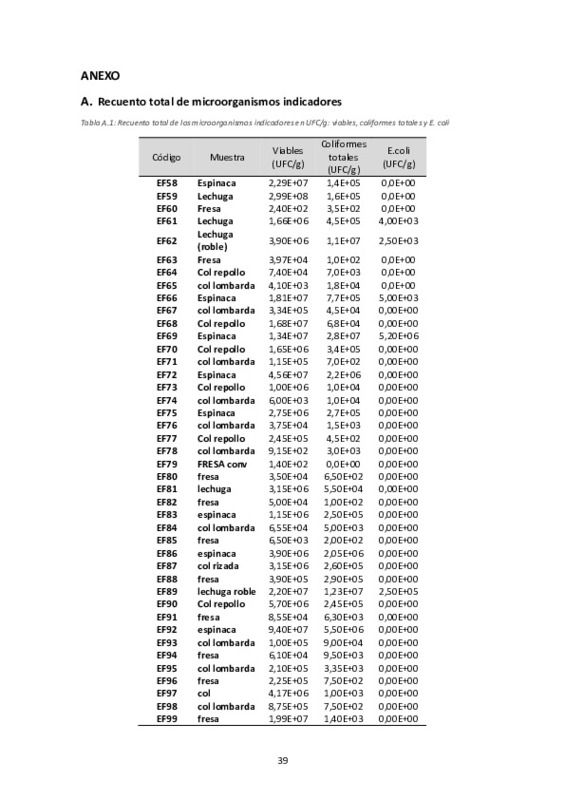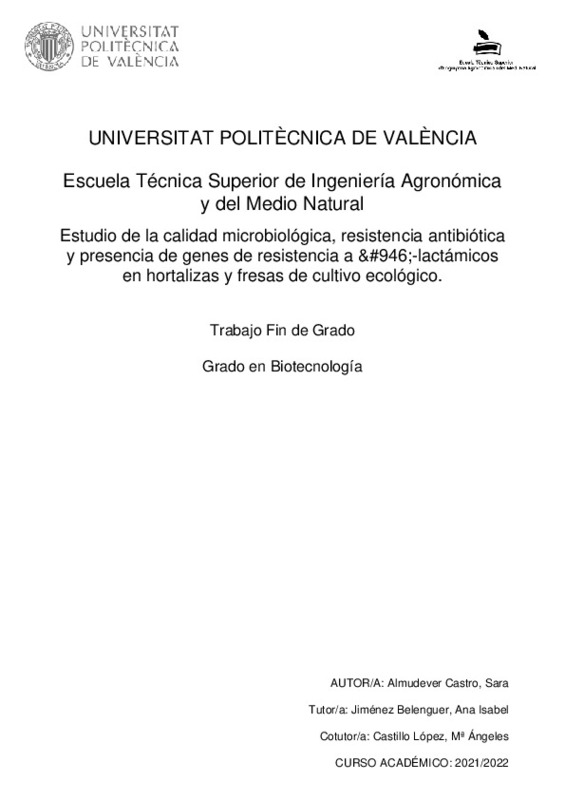|
Resumen:
|
[ES] Recientemente se ha observado un auge en el consumo de hortalizas y frutas de cosecha orgánica cuyo consumo en crudo puede suponer un riesgo en la seguridad alimentaria para el consumidor, ya sea por su potencial ...[+]
[ES] Recientemente se ha observado un auge en el consumo de hortalizas y frutas de cosecha orgánica cuyo consumo en crudo puede suponer un riesgo en la seguridad alimentaria para el consumidor, ya sea por su potencial patógeno o por la presencia de genes de resistencia a antibióticos, problema de gran importancia y de preferencia en las acciones de la comunidad sanitaria internacional (OMS). Se plantea realizar un estudio sobre hortalizas y fresas de cultivo ecológico de diferentes establecimientos de Valencia, para determinar su papel en la dispersión de bacterias resistentes a antibióticos y sus genes. Asimismo, se estudiará la calidad microbiológica de las muestras mediante indicadores de contaminación (microorganismos viables aerobios mesófilos, coliformes totales y Escherichia coli). A su vez, se aislarán bacterias pertenecientes a los principales grupos de riesgo clínico (KESC y Acinetobacter) resistentes a β-lactámicos. Seguidamente se determinará su sensibilidad a distintos antimicrobianos por el método antibiograma disco-placa. Para finalizar, se estudiará la presencia de genes de resistencia a β-lactámicos (blaTEM, blaSHV y blaCMY-2) en las muestras y en los aislados.
[-]
[EN] Recently, there has been a boom in the consumption of organically grown vegetables and fruits; their raw consumption may suppose a food safety risk to the consumer, either because of their pathogenic potential or ...[+]
[EN] Recently, there has been a boom in the consumption of organically grown vegetables and fruits; their raw consumption may suppose a food safety risk to the consumer, either because of their pathogenic potential or because of the presence of antibiotic resistance genes, a problem of great importance and of preference in the actions of the international health community (WHO). In this study, different samples of organically grown lettuce, spinach, cabbage and strawberries from different establishments in Valencia were analysed to determine their role in the spread of antibiotic resistant bacteria and their genes. First, the microbiological quality of the samples was studied using contamination indicators (viable mesophilic aerobic microorganisms, total coliforms, and Escherichia coli). The levels of mesophilic aerobic microorganisms detected are below the maximum levels, which evences an optimal sanitary quality in the products analysed. However, in 35,7% of the samples, high values of total coliforms were detected; and finding in 11,9% of these samples E. coli, which indicates contamination of faecal origin in the samples. Bacteria belonging to the main clinical risk groups (KESC and Acinetobacter) were isolated, suspicious of being resistant to third generation cephalosporins and carbapenems, antibiotics of the ß-lactamic family. These isolates were identified biochemically and by 16S ribosomal RNA gene sequencing, where only 33,3% matches were found between the two methods. The sensitivity of the isolates to different antimicrobials was then determined by the disc-plate antibiogram method, being detected 25,6% of multidrug-resistant bacteria. Finally, the presence of ß-lactam resistance genes (blaTEM, blaSHV y blaCMY-2) was studied in the samples and in the isolates. No genes were detected in the samples, although two of the three genes were detected in 20,03% of the isolates tested. The results show the risk of consuming raw leafy green vegetables and unwashed strawberries as they can serve as a reservoir for multidrug-resistant microorganisms. This highlights the need for epidemiological surveillance of these micro-organisms, as their spread would hinder antimicrobial treatment of infections caused by these micro-organisms.
[-]
|








